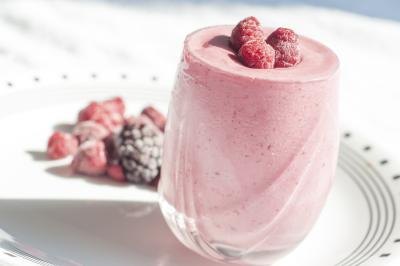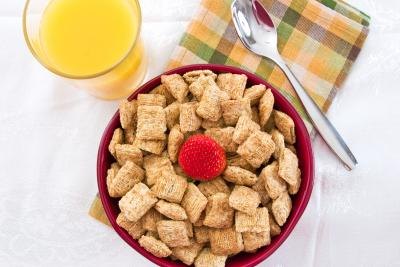
Overview
Starting each day with a healthy breakfast can enhance your energy, ability to concentrate and help prevent food cravings and overeating later in the day. An ideal breakfast contains healthy foods from numerous food groups, including fruits and vegetables, complex carbohydrates, such as whole grain cereals, and lean protein sources, such as low-fat milk. To determine what foods and portion sizes best suit you, discuss your diet with a qualified professional.
Fruits and Vegetables

Fresh and vegetables contribute significant amounts of vitamins, minerals and antioxidants, which enhance your immune system; water, which supports your hydration needs; and fiber, which is vital for digestive wellness. Incorporating fruit or vegetables into your breakfast can give you a jump start toward meeting the Dietary Guidelines for Americans' recommendation of at least 2 cups of fruit and 2 1/2 cups of vegetables per day. Berries and sliced bananas provide nutritious topping for cold cereals. Adding dried fruit, such as raisins, apricots or cranberries, to your oatmeal adds flavor and substantial amounts of fiber. Frozen fruit provides a nutrient-rich alternative to ice in fruit smoothies. To increase your vegetable intake, incorporate vegetables into breakfast burritos, omelets or scrambled eggs. Leftovers, such as leftover vegetable pizza or soup, provide valuable options when you are crunched for time.
Whole Grain Breads and Cereal

Whole grains are rich in fiber and nutrients, such as B-vitamins, selenium, magnesium and iron. Vitamin-fortified whole grain cereals, such as Total and Raisin Bran, supply your daily recommended allowance of most of your essential vitamins and minerals as well. Since whole grains are more satiating than refined grains, opting for whole grain breads and cereals at breakfast can help prevent excessive hunger and snacking between meals and keep your blood sugar and energy levels balanced. For best results, choose whole grain cereals that provide at least 3 grams of fiber and less than 13 grams of added sugar per serving. Examples of nutritious whole grain breakfast foods include 100 percent whole toast, bagels and English muffins, old fashioned and steel-cut oatmeal, whole grain cold cereals, such as Shredded Wheat and Bran Flakes and scrambled eggs or tofu with quinoa.
Low-Fat Dairy Products

Incorporating protein-rich foods into your breakfast can enhance your ability to concentrate and learn, and ensure that your energy levels remains stable. In addition to providing protein, low-fat dairy products provide significant amounts of nutrients, such as calcium, vitamin D, potassium and zinc. The Dietary Guidelines for Americans recommends at least three servings of low-fat dairy products daily as part of a 2,000 calorie diet. To incorporate dairy products into your breakfast meals, enjoy skim or low-fat milk with whole grain cereal or prepare a fruit smoothing using yogurt or low-fat milk. Low-fat cheese can enhance flavor and nutrient content of egg dishes and breakfast wraps. Kefir and yogurt provide probiotics—healthy bacteria that enhance digestion and help prevent infections. If you do not consume or tolerate dairy products, non-dairy equivalents, such as soy and lactose-free milk, provide similar benefits.
www.livestrong.com





No comments:
Post a Comment